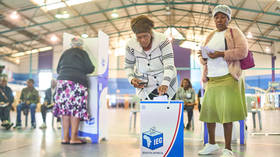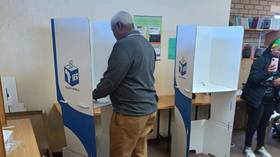Voting underway in South Africa

South Africans have begun voting for new members of the National Assembly and regional parliament in what is expected to be the hottest-contested election since the end of Apartheid three decades ago.
The Independent Electoral Commission (IEC) announced the opening of polling stations across the country early on Wednesday for some 28 million voters to cast their ballots.
“We’re officially on! Voting stations are now open until 9pm… Happy voting, South Africa. It’s your democracy, own it,” the IEC wrote on X (formerly Twitter).
The commission is expected to announce the final results within seven days.
More than 50 registered political parties – the majority of which are new, including the uMkhonto we Sizwe (MK) party, led by former South African president Jacob Zuma – are contesting the general election.
The Democratic Alliance (DA) – South Africa’s largest opposition party, accused by the government of attempting to “mortgage” the country’s sovereignty to foreign powers such as the US – has formed an alliance with several smaller parties to broaden its appeal in an effort to unseat the ruling coalition.
The DA has been accused of representing white privilege in a country where 81.4% of the population is black. The party’s leader, John Steenhuisen, has denied the allegations.
The ruling African National Congress (ANC), in power since the end of white minority Apartheid 30 years ago, is projected to lose its majority for the first time as recent polls indicate it has less than a 50% chance of winning.
The ANC government has been criticized for failing to deliver on its “better life for all” promise, which helped its first leader, Nelson Mandela, win the country’s first democratic election in 1994 and has kept the party in power since then.
South Africa is currently the continent’s largest economy, according to International Monetary Fund (IMF) data for 2024, but the country has some of the world’s deepest socio-economic issues, including persistent crime and poverty. Its official unemployment rate of 32% – and 45% for those aged between 15 and 34 – has been ranked by the World Bank as the worst of any nation.
Cyril Ramaphosa, who was sworn in as president of South Africa in 2018 following Jacob Zuma’s resignation, has vowed to perform “better, do more, and do faster” if his ANC wins the election.
During his final campaign on Sunday, President Ramaphosa outlined some of his government’s accomplishments, including providing assistance to more than 1,000 black industrialists over the past five years, and establishing a specialized police taskforce to combat crime.
“There is more work to be done,” he said.
“The last five years have been a time of rebuilding and recovery. It has been about working together not only to meet the challenges of the moment, but to put in place firm foundations for a better future,” the president added.













